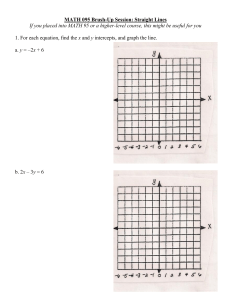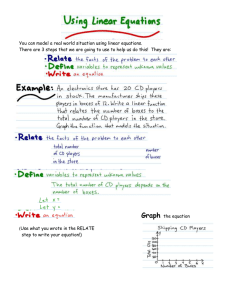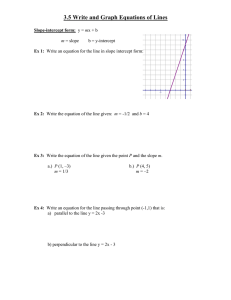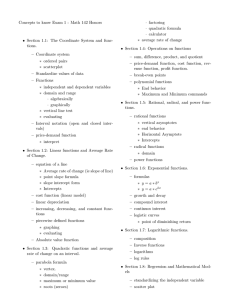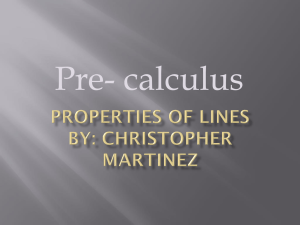Westside High School Lesson Plan
advertisement
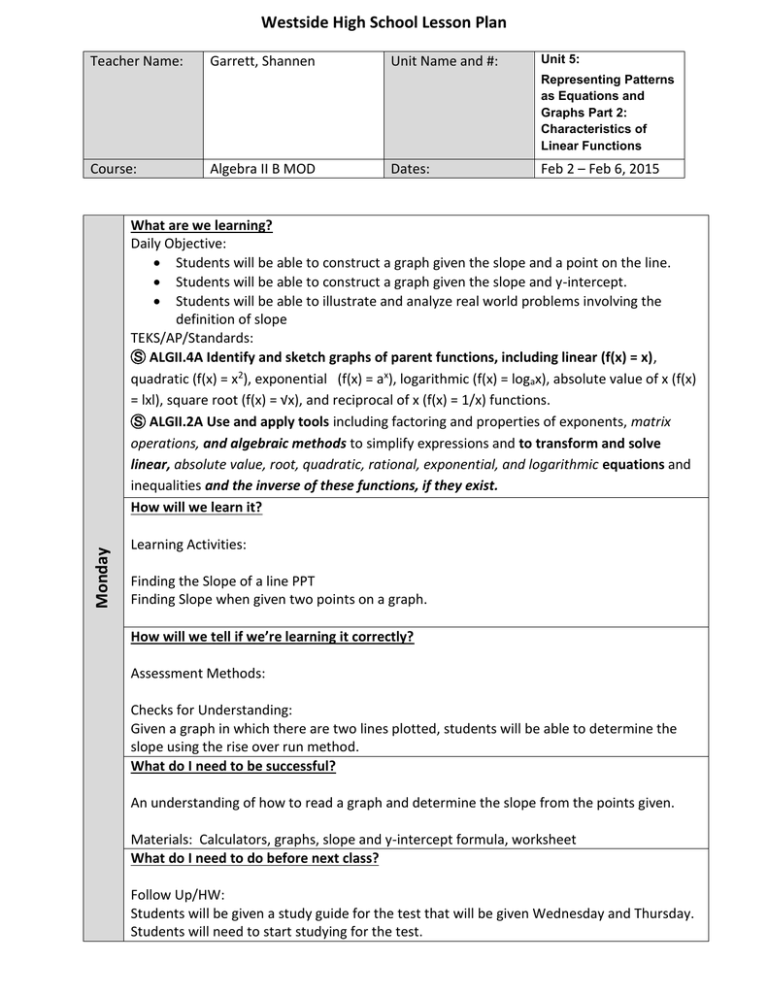
Westside High School Lesson Plan Teacher Name: Garrett, Shannen Unit Name and #: Unit 5: Representing Patterns as Equations and Graphs Part 2: Characteristics of Linear Functions Course: Algebra II B MOD Dates: Feb 2 – Feb 6, 2015 Monday What are we learning? Daily Objective: Students will be able to construct a graph given the slope and a point on the line. Students will be able to construct a graph given the slope and y-intercept. Students will be able to illustrate and analyze real world problems involving the definition of slope TEKS/AP/Standards: Ⓢ ALGII.4A Identify and sketch graphs of parent functions, including linear (f(x) = x), quadratic (f(x) = x2), exponential (f(x) = ax), logarithmic (f(x) = logax), absolute value of x (f(x) = lxl), square root (f(x) = √x), and reciprocal of x (f(x) = 1/x) functions. Ⓢ ALGII.2A Use and apply tools including factoring and properties of exponents, matrix operations, and algebraic methods to simplify expressions and to transform and solve linear, absolute value, root, quadratic, rational, exponential, and logarithmic equations and inequalities and the inverse of these functions, if they exist. How will we learn it? Learning Activities: Finding the Slope of a line PPT Finding Slope when given two points on a graph. How will we tell if we’re learning it correctly? Assessment Methods: Checks for Understanding: Given a graph in which there are two lines plotted, students will be able to determine the slope using the rise over run method. What do I need to be successful? An understanding of how to read a graph and determine the slope from the points given. Materials: Calculators, graphs, slope and y-intercept formula, worksheet What do I need to do before next class? Follow Up/HW: Students will be given a study guide for the test that will be given Wednesday and Thursday. Students will need to start studying for the test. What are we learning? Daily Objective: Students will be able to construct a graph given the slope and a point on the line. Students will be able to construct a graph given the slope and y-intercept. Students will be able to illustrate and analyze real world problems involving the definition of slope TEKS/AP/Standards: Ⓢ ALGII.4A Identify and sketch graphs of parent functions, including linear (f(x) = x), quadratic (f(x) = x2), exponential (f(x) = ax), logarithmic (f(x) = logax), absolute value of x (f(x) = lxl), square root (f(x) = √x), and reciprocal of x (f(x) = 1/x) functions. Ⓢ ALGII.2A Use and apply tools including factoring and properties of exponents, matrix operations, and algebraic methods to simplify expressions and to transform and solve linear, absolute value, root, quadratic, rational, exponential, and logarithmic equations and inequalities and the inverse of these functions, if they exist. How will we learn it? Tuesday Learning Activities: Graphing Lines in Slope-Intercept Form Graphing Lines Given a y-intercept and an ordered pair. How will we tell if we’re learning it correctly? Assessment Methods: Teacher observation Worksheets Checks for Understanding: Given a problem in Slope-intercept form, students will be able to graph the line using the information provided. Given a problem in which the y-intercept and an ordered pair are given, Students will be able to graph a line. What do I need to be successful? An understanding of how to read a problem in slope-intercept form and determine what the graph will look like. Materials: Calculators, graphs, slope and y-intercept formula, worksheet What do I need to before next class? Follow Up/HW: Working with Linear Equations Wed/Thur What are we learning? Daily Objective: Students will be able to define slope in three different ways. Students will be able to identify the slope of a line as positive, negative, zero, or undefined. Students will be able to explain how to determine the slope of a line given two points Students will be able to construct a graph given the slope and a point on the line. Students will be able to illustrate and analyze real world problems involving the definition of slope TEKS/AP/Standards: Ⓢ ALGII.4A Identify and sketch graphs of parent functions, including linear (f(x) = x), quadratic (f(x) = x2), exponential (f(x) = ax), logarithmic (f(x) = logax), absolute value of x (f(x) = lxl), square root (f(x) = √x), and reciprocal of x (f(x) = 1/x) functions. Ⓢ ALGII.2A Use and apply tools including factoring and properties of exponents, matrix operations, and algebraic methods to simplify expressions and to transform and solve linear, absolute value, root, quadratic, rational, exponential, and logarithmic equations and inequalities and the inverse of these functions, if they exist. How will we learn it? Learning Activities: Slope Centers/Slope Scavenger Hunt Think Through Math – Self-Paced Learning using computers How will we tell if we’re learning it correctly? Assessment Methods: Correct completion of Slope centers/Slope Scavenger Hunt Checks for Understanding: Teacher observation Friday What do I need to be successful? Materials: Computers, ThinkThroughMath, Pencils, calculators, slope centers record sheet, Scavenger Hunt recording sheet. What do I need to before next class? Follow Up/HW: What are we learning? Daily Objective: Students will be able to construct a graph given the slope and a point on the line. Students will be able to construct a graph given the slope and y-intercept. Students will be able to illustrate and analyze real world problems involving the definition of slope TEKS/AP/Standards: Ⓢ ALGII.4A Identify and sketch graphs of parent functions, including linear (f(x) = x), quadratic (f(x) = x2), exponential (f(x) = ax), logarithmic (f(x) = logax), absolute value of x (f(x) = lxl), square root (f(x) = √x), and reciprocal of x (f(x) = 1/x) functions. Ⓢ ALGII.2A Use and apply tools including factoring and properties of exponents, matrix operations, and algebraic methods to simplify expressions and to transform and solve linear, absolute value, root, quadratic, rational, exponential, and logarithmic equations and inequalities and the inverse of these functions, if they exist. How will we learn it? Learning Activities: Graphing Lines Given Two Ordered Pairs How will we tell if we’re learning it correctly? Assessment Methods: Worksheet-Graphing Lines Given Two Ordered Pairs Checks for Understanding: Circulation around the room to assess individual understanding What do I need to be successful? Materials: Pencils, Worksheet, computer, calculators What do I need to before next class? Follow Up/HW:
